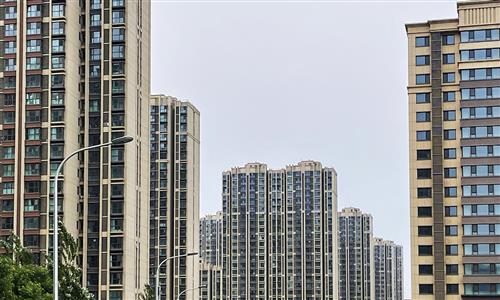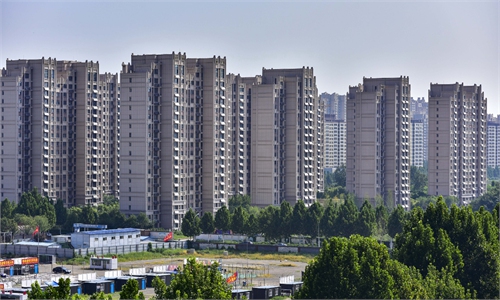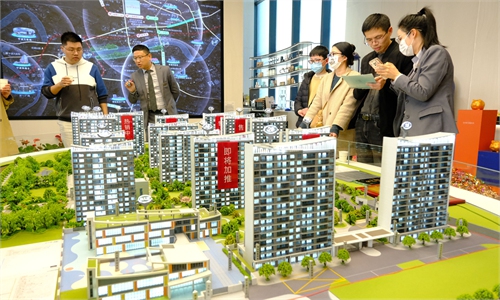
Illustration: Chen Xia/Global Times
Two major Chinese urban centers, Hangzhou in East China's Zhejiang Province and Xi'an in Northwest China's Shaanxi Province, recently moved to scrap all administrative restrictions on buying a house in the two cities. This bold move is aimed at reviving the local property market. It is expected that more cities will adopt similar measures in order to boost an important economic sector that accounts for about 20 percent of the country's GDP.Earlier, Chinese first-tier cities including Beijing, Shanghai, Shenzhen and Guangzhou have taken specific and targeted measures to spur home sales. Beijing, for example, stated on April 30 that it would allow locals and non-locals who have met social insurance payment requirements to buy an additional house outside the city's Fifth Ring Road.
Shenzhen, a global technology hub, has decided to lower the thresholds for personal income tax and social insurance payments for non-locals to purchase property in a number of designated districts within the city. Shanghai and Guangzhou have also taken similar measures to accelerate property sales and shore up local economic growth.
The change in housing policy is both timely and warranted. Whenever a reform plan is needed to revive an industry in China, the Chinese government will assist with a targeted restructuring scheme.
The substantive housing market easing measures currently being implemented by Chinese cities will help boost confidence in 2024 and beyond. Coupled with the extraordinary monetary easing policies, such as low mortgage rates put in place by the People's Bank of China, the central bank, those who have been hesitant to buy their dream home may now be inspired to take action. It is expected the all-important real estate sector will stabilize and begin to rebound late this year or even sooner.
China's central bank cut the benchmark five-year loan prime rate (LPR) by 25 basis points to 3.95 percent in late February, marking the largest rate rollback since the LPR system was introduced in 2019. This move was aimed at accelerating home purchases and boosting the economy. The steep rate cut significantly decreases the cost of owning a home in China and eases repayment pressure on existing home loans.
Following the sector's correction over the past three years, the Chinese government is now encouraging local cities to take appropriately tailored measures to rejuvenate the real estate sector.
It is widely believed that a shorter and smoother transition for the property industry is highly achievable. For instance, allowing more market-based adjustment in housing prices and taking quick and effective measures to reform and overhaul financially-strapped developers will help clear the overhang of home inventories being faced by Chinese cities. Also, gradually revived home transactions will help ease public jitters that home prices will continue to drop.
For some time, a number of American and Western publications had predicted China's property market would crash, the same way as Japan hit a brick wall in early 1990s, or the US witnessed in the 2008 subprime debacle. However, these publications are to be disappointed this time as China has many effective means in its toolbox to fix the problem.
Around seven years ago, the Chinese government took the initiative to address an evolving property bubble by tightening bank policies that allowed developers to borrow excessively and recklessly. The government also moved to curb property market speculation by ordering all major Chinese cities to institute highly restrictive home-buying and selling rules.
More recently, witnessing the apparent effect of the real estate sector slowdown, the government has started to focus on helping the sector transition to a more appropriate and sustainable size, including ramped-up efforts to boost urban rental housing, expand construction of affordable housing projects, and refurbish and upgrade under-developed downtown neighborhoods to guide the industry toward a more healthy and viable development route.
During the recent May Day holidays, Shanghai's real estate association and other industry groups unveiled an initiative aimed at providing greater benefits to residents seeking to sell their home and buy a new one. The trade-in measure is also trialed out in other Chinese cities, such as Central China's Zhengzhou and South China's Haikou. In Chengdu city, another metropolis in Southwest China, local authorities are pledging great support for developers' reasonable financing needs, and the city will no longer review qualifications for those interested in buying a home there.
Looking to the future, the property market faces additional pressures from some structural adjustment factors, particularly demographic changes. Nevertheless, the steadily growing middle-class or well-off families' demand for spacious and better-quality houses is on the rise. Detached or semi-detached houses are likely to be in great demand before 2050 as the upper middle class continues to build up their family wealth.
So, future prospects for the property sector are largely auspicious and promising.
The author is an editor with the Global Times. bizopinion@globaltimes.com.cn



